I want a better world!
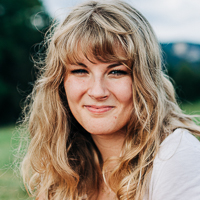
Klára Kalinová is the new coordinator of the Chalantika project. She studied international development and international social and humanitarian work. She has an interesting work experience in Uganda, Zambia, and France. She enjoys photography, hiking, playing violin, guitar and singing. She says what people need is love - to love and be loved.
Klara, could you introduce yourself briefly?
I'm an active person, I always need something to do. I like people, being with them, and making new friends. I like to give my energy to something that gives me meaning. I love nature, and time outdoors is a great relaxation for me. I also like music, dancing, and sports.
Active, social, relational, musically talented, and into sports.
(Laughs) I like photography as well, I haven't said that yet.
You studied international development, humanitarian and social work. Why did you choose these fields and what did you find enriching about your studies?
I have a vision of a profession that I will not only enjoy, but that will also benefit others. My studies have given me a lot of opportunities for personal development and travel, which are closely related. I push myself the most when I'm on the road, out of my comfort zone.
During internships in Uganda and Zambia, I was exposed to the contrast between life here and in Africa. I saw poverty, as a very different life for people. It gave me a global perspective, more humility, and gratitude.
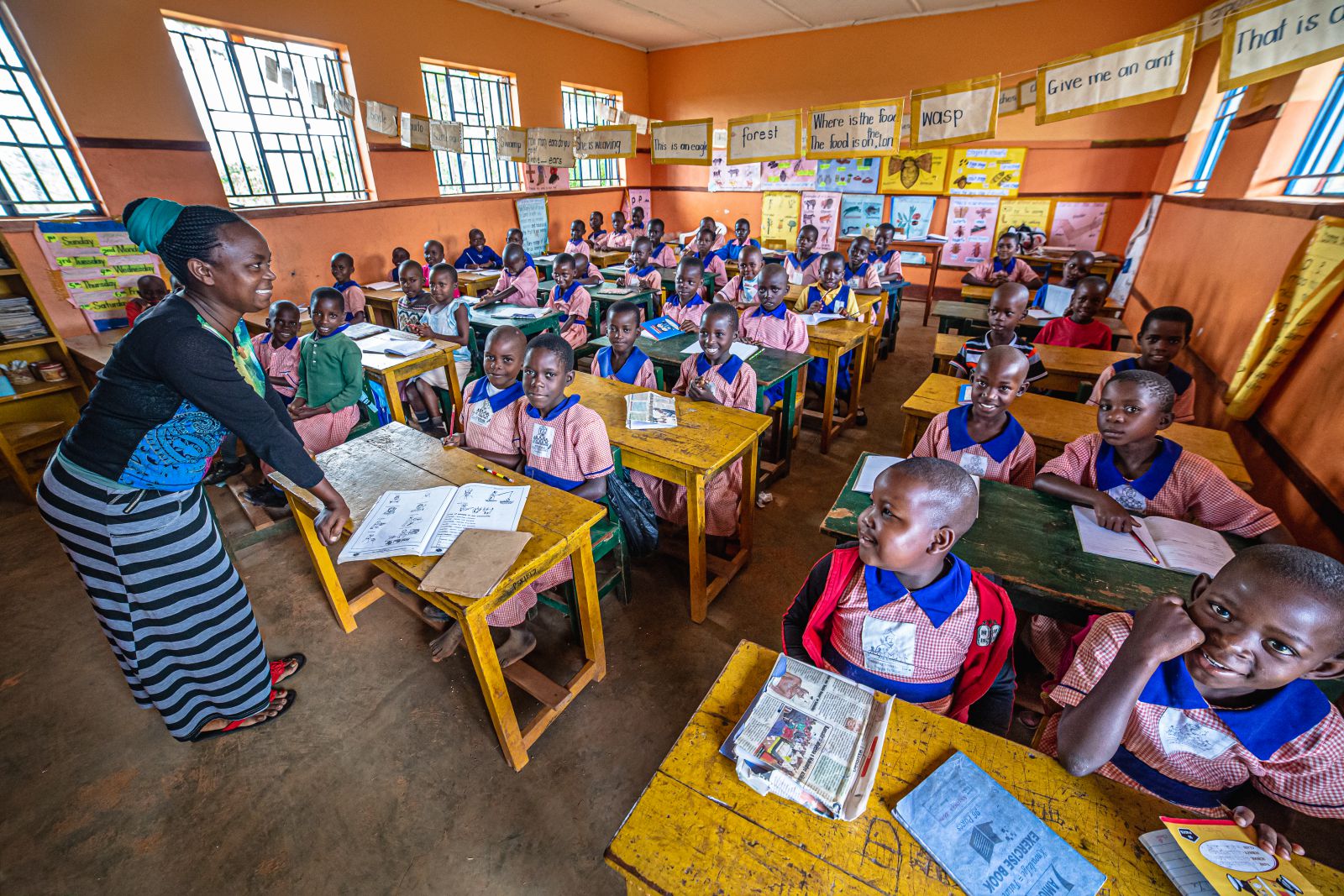 Second grade English lesson at Nepomuk Primary School in Kitula, Uganda.
Second grade English lesson at Nepomuk Primary School in Kitula, Uganda.
How is the life of people in Uganda and Zambia the same and how is it different from life in the Czech Republic?
The difference is in the perspective. In our country, people often live in a hurry, people complain, and they swear (this applies to me as well). We don't laugh much. Sometimes we are too absorbed in our own worries to see more.
In Africa, people often face extremes like hunger, sickness, and death. They live more in the present and more in the community. They have to because they don't have social security there. They don't have a system to provide some basic standards, and the state will not help them. They need to be supported in the community. Relationally, and financially, however, they can. I wish communities would work more in our country. Here, we are often mainly on our own with the guarantee of support from the Czech system.
And what do we have in common? All basic human needs, including a sense of dignity and recognition, love, and the need for relationships. We all want to be loved and to love.
When you first came to Africa, what was the hardest thing for you?
It was a challenge. Definitely, a huge culture shock that took me some time to process. Even though we were prepared at school, even though I had experience with people from elsewhere. When you get there, it's completely different. And you look at everything like Alice in Wonderland. The way they live, the way the traffic works, the way the market looks. The basic things that we need to live and that we interact with on a daily basis, all work differently. But over time, you get used to it. I miss a lot of things in the Czech Republic now.
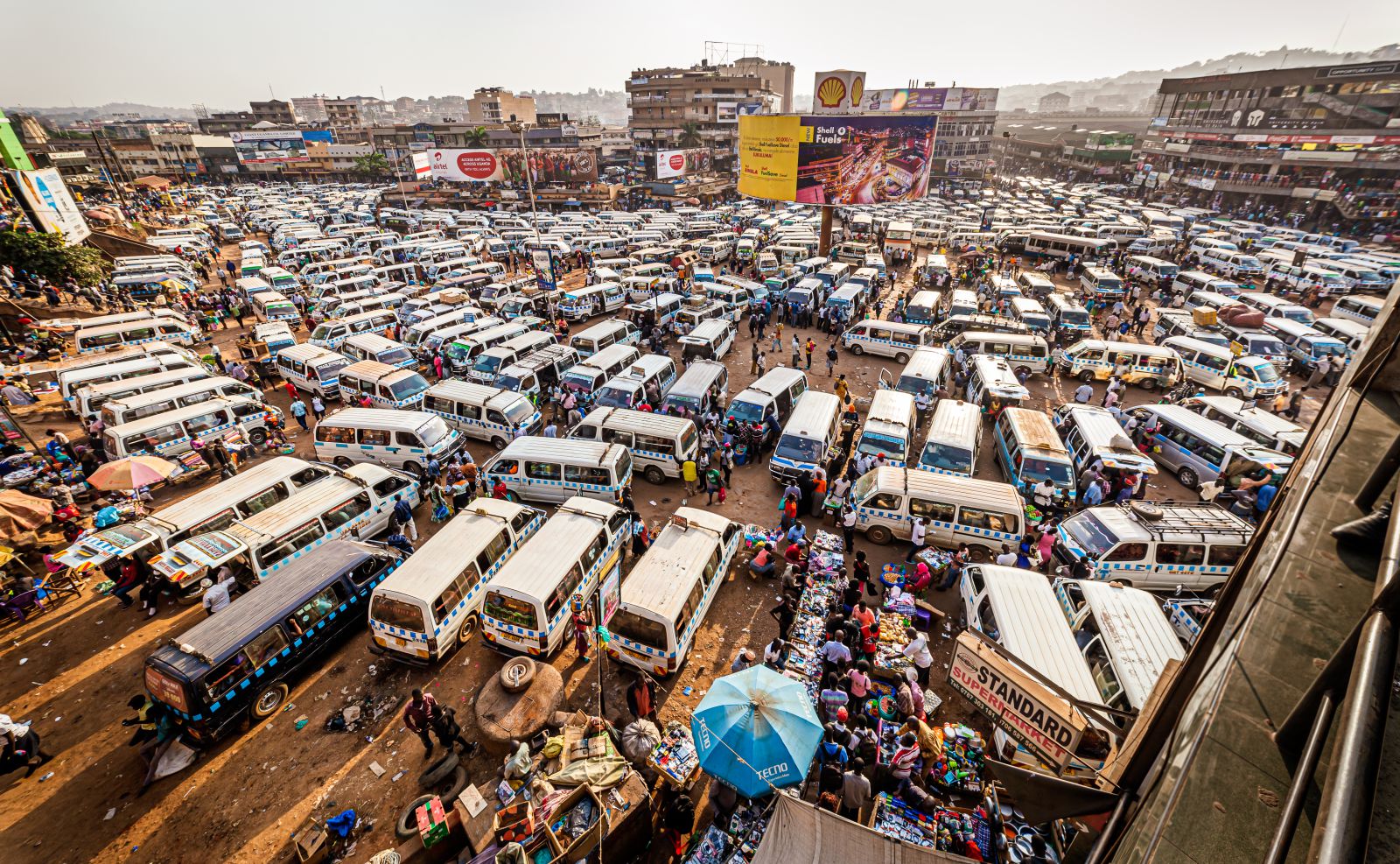 Taxipark in Uganda's capital, Kampala - like a bus station
Taxipark in Uganda's capital, Kampala - like a bus station
Like what?
Maybe an interest in the people around you. At the market, the saleslady and I smile at each other, exchange a few words in whatever she can say and I can understand, either in English or in the local language. Such warmth, you definitely feel the human connection more there. Even just saying hello is not commonplace here. When you say hello to someone in Prague, sometimes they look at you like "why"?
Do you have any funny experiences?
Absolutely. Such situational jokes arising from cultural differences, which I don't think are completely transferable, go to Africa and see for yourself. :)
In particular, I found it funny that I learned how to iron in Uganda. There it is unacceptable to walk around in wrinkled clothes, the locals are sensitive to it and are not afraid to tell you that you walk like a peasant. I don't iron at home, but I had to. After every wash. :D
And the most profound experience?
Probably the Ugandan engagement, "The Introduction Ceremony", which is more culturally experienced there than the wedding. The bride doesn't receive a dowry from her family as we do but is given by the man to show that he is capable of taking care of the woman. He has to give the dowry to the bride's family.
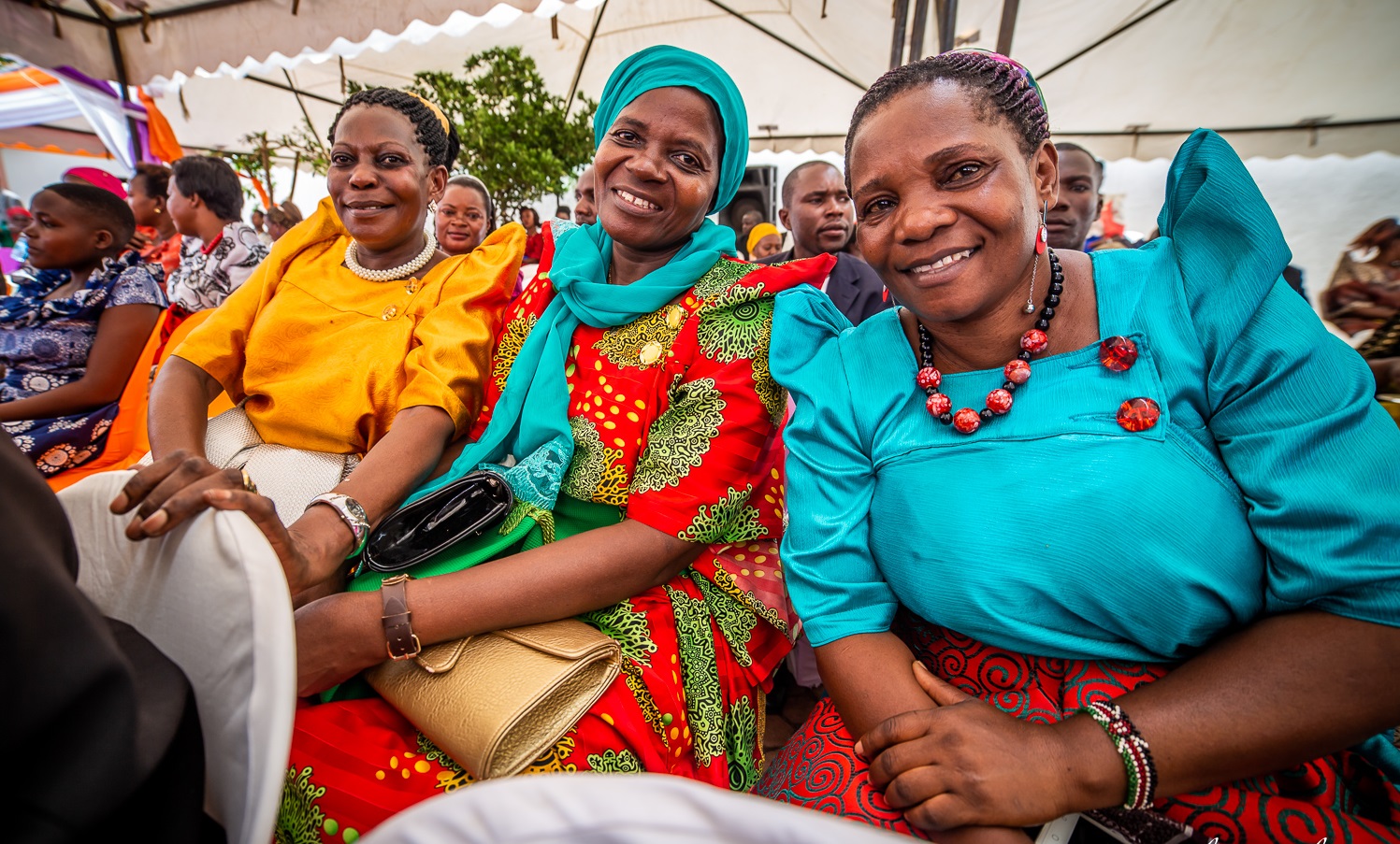 Ugandan women's festive dress
Ugandan women's festive dress
And there was one moment when the groom-to-be and his people were unloading a huge pile of gifts from the truck. Foodstuffs like bags of rice, flour, animals, chickens, goats, cows, leather sofas, televisions... A group of about twenty ragged children, obviously from very poor backgrounds, were milling about. They were peering into the yard over the fence, trying to get in carefully. There were guards at the gate who wouldn't let them in and chased them away with guns. I was very impressed by the contrast. On the one hand, the rich class - the groom was a government official and the bride a doctor. On the other side, are the children of the underclass. You could see the enormous wealth, and that even if they have everything, they won't share it. Food, even if it's just leftovers from lunch. The children got nothing. And the contrast was striking.
So the question is, what kind of world are we living in?
Exactly. Where's the justice and where's the compassion?
We were talking about Uganda. But you've been to Zambia recently. What did you do there?
It was doing an internship. I'm studying international development and agricultural economics at the Faculty of Tropical Agriculture in Prague. In the context of my thesis work, which is focused on the empowerment of women in agricultural cooperatives in Zambia, I had the opportunity to go on a Caritas Czech Republic mission to collect data and experiences, among other things, to field villages among farmers. I only spent a month there, but it was intense.
.jpg) Interviews with women farmers and farmers from cooperatives in rural Zambia
Interviews with women farmers and farmers from cooperatives in rural Zambia
I experienced a stay in a Zambian hospital (laughs), and shortly after returning home, we experienced the Czech parliamentary elections. We drove about 10 hours from Western Province to the embassy in Lusaka to exercise our precious right to vote (laughs). At the embassy, we met other Czechs living or working in Zambia. It was such a weekend trip. A great experience, but it would have all been much easier with the option of voting by correspondence.
.jpg) Parliamentary elections 2021 at the Czech Embassy in Lusaka, the capital of Zambia
Parliamentary elections 2021 at the Czech Embassy in Lusaka, the capital of Zambia
How's the photography going?
I like taking pictures. People, emotions, mostly. Family or couple shoots, weddings. I started taking pictures about five years ago as part of the Man and Faith Association. The initial workshop taught me photography basics and photo editing. Then I learnt from the more experienced ones and the professionals. We have a system of mentoring and peer approval of photos, and that pushed me a lot. We organize exhibitions, we also make available a photo bank on the website. It's a database that organizations and media draw from.
You're photographing a faith that manifests itself in people's lives. That's a nice thought.
Man and Faith started as a project more than 10 years ago, bringing faith closer and breaking down prejudices. Now we're over 150 of us. In the Czech Republic, Slovakia, in Egypt. As photographers, we also take pictures abroad, for example, I brought a lot of beautiful moments from Uganda. The depth of their ceremonies, the African music, and the festive clothes, it's impossible to describe.
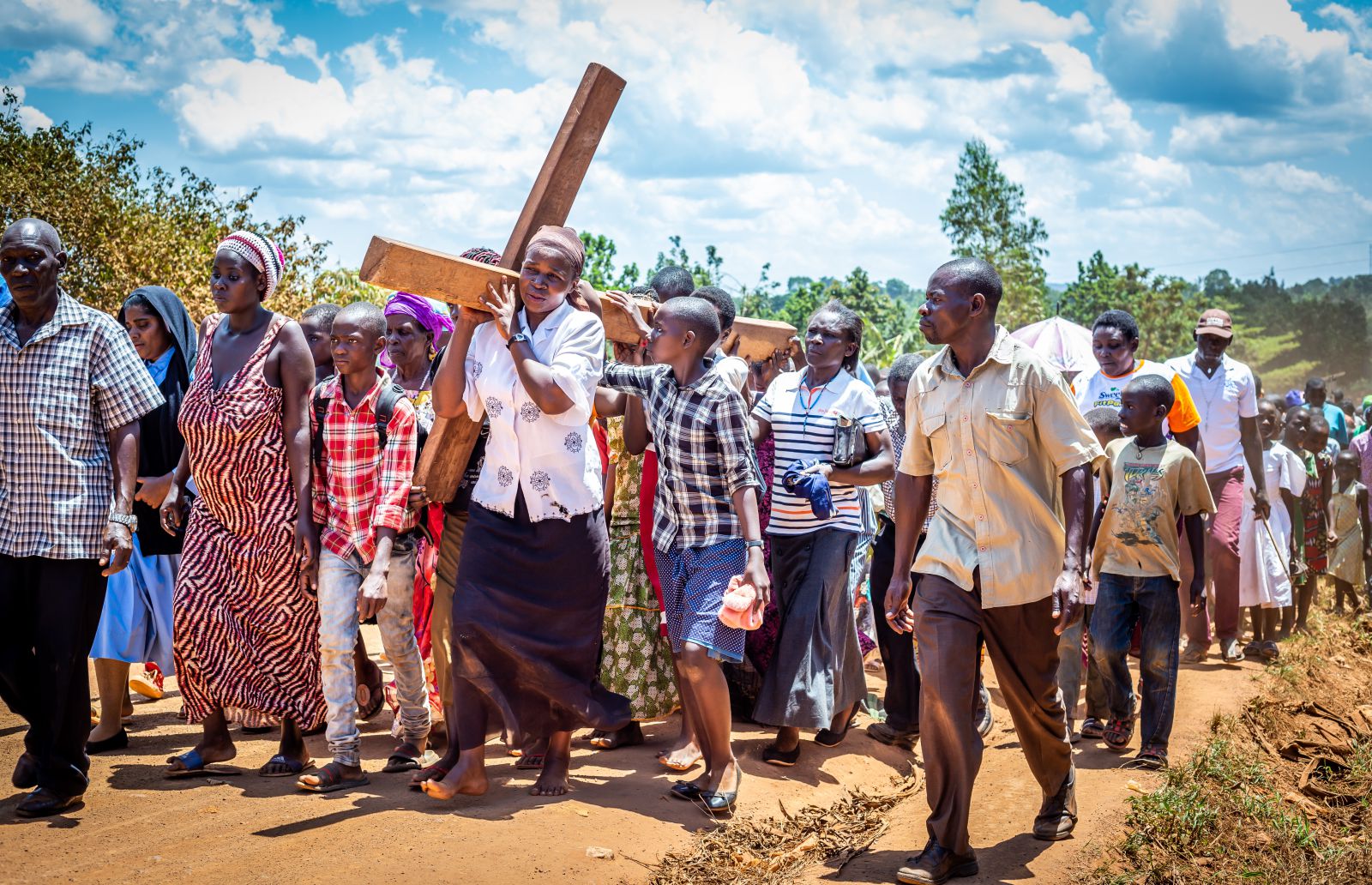 The symbolic ceremony of the Way of the Cross out of the city on Good Friday in Uganda. Four kilometers, hundreds of people burning in the midday sun. (Klara Kalinova, Man and Faith)
The symbolic ceremony of the Way of the Cross out of the city on Good Friday in Uganda. Four kilometers, hundreds of people burning in the midday sun. (Klara Kalinova, Man and Faith)
Klara, you also sing and play guitar and violin. Who brought you to it and what is music for you?
I went to music school to play the violin, I am self-taught on guitar. And I developed my singing variously in bands, amateurishly.
My parents brought me to it. I originally wanted to play the flute, but we were late for the music school, it was full. And the teacher we were with was a violin teacher, and she said she still had some free space.
And she pulled you in, huh?
(laughs) She gave me the violin in my hands and I said, why not? I went through two cycles of music school. I don't play anywhere now, it's more like relaxation.
Like when we go on a trip with the group. Someone takes the guitar, I take the violin, and my friend takes the mandolin. It's a kind of tramp style. Classic campfire songs, but also modern songs, and that's probably the best thing for me. Sharing music with others, improvising. I'm not into solo playing or playing in an orchestra with a fixed order. Rather, I play for fun in a group.
So if we were to have an in-house BanglaCala Christmas evening, you could maybe play a Christmas carol?
Sure, no problem. :)
Do you have any personal vision?
I want a slightly better world. That's why I joined Adra, why I'm going in this direction.
That's nice. What are you looking forward to in the Chalantika project?
New things. Bangladesh, the culture and the people. To have the opportunity to be creative, to be inventive, to organize something, to influence the project. Overall, I'm looking forward to this job. :)
Klára, thank you for the interview.
Also, thank you! :)
Do you want to join Chalantika team? Support the center!



